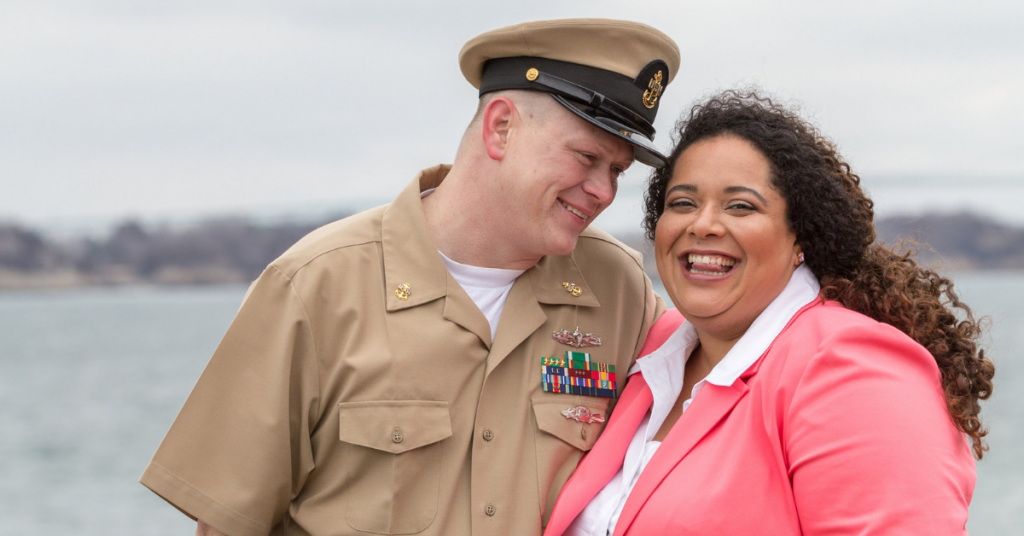I’ll never forget my husband’s first military deployment to Iraq. Scheduled to leave a couple of days after Christmas, the overarching feeling I remember from that holiday season was a constant sense of dread. Everything was colored by it, that apprehension, like someone had taken a broad brush and painted over my entire life with watercolor grey. Since then, our military family has been through multiple more military deployments and separations. Younger military spouses often ask me, “Does military deployment get easier?”
My answer to that is yes and no.
Yes, it does get easier because you know what to expect, and, it’s not easier at all because, well, you know what to expect.
Sound like conflicting advice? There’s nothing like a military deployment to make you feel conflicted! So let’s start there.
Some things you’ll likely feel during your spouse’s military deployment:
1. Conflicting emotions
In the days leading up to the military deployment, you dread them leaving, you’re scared for their safety, you’re not looking forward to being apart because hello, you kind of like being married. Contrast that with feeling like, Ok, let’s get on with this already and skip past all the delays so I can start checking off the days until we’re back together again.
You’ll probably feel all these emotions at once–dread at the goodbyes, while wanting to pull off the Bandaid. Remember the scene in 12 Strong, the night before Chris Hemsworth’s character left for Afghanistan? He and his wife were both wakeful but unwilling to break the silence during those last moments together. Yep, been there, and I bet you have, too.
2. Feeling alone and watching the world go by
I’m going to put this out there. Having your loved one in a bad place, surrounded by bad people who want to do bad things to them, is outside the realm of what most of your contemporaries are going through. There is nothing normal about this scenario, and it can feel very isolating. In fact, I believe it’s a form of grief.
Your mind and heart are elsewhere, but somehow you’re required to carry on with the normalcies of life: commuting to work, picking up groceries, running kids to school and soccer and dance and playdates, all while inside your mind is screaming, I haven’t heard from my loved one in 36 hours…is he ok? Am I going to see his face on the news?
C.S. Lewis remarked on grief after his wife died, and I think it also applies to this unnamed grief of watching your spouse head off into war:
“No one ever told me that grief felt so like fear. I am not afraid, but the sensation is like being afraid. The same fluttering in the stomach, the same restlessness…At other times it feels like being mildly drunk, or concussed. There is a sort of invisible blanket between the world and me.
I find it hard to take in what anyone says. Or perhaps, hard to want to take it in.”
What I want to reaffirm to you is that you are not alone. There are so many others who’ve been down this path. You’re reading this post on a site put together by military spouses just like you. Reach out. Find a local group or connect to the larger military spouse community. We are here for you!
3. Guilt over not being a “good friend”
Maybe this has happened to you. You mention you’re having a hard time with this military deployment, and another spouse goes into a diatribe of how at least your separation is only 6 months, or a year, or whatever number less than what he or she’s done. My first reaction to that is, move along. Find a better support system. You don’t need that kind of negative input.
Be kind and give yourself time to adjust or step away from regular activities when you need to. You don’t have to apologize or explain. Your true friends will understand. And you know what? It’s a good sign that you miss your spouse so much.
“How lucky am I to have something that makes saying goodbye so hard?” — A.A. Milne
4. Struggle over feeling connected to your spouse
It’s natural. You’re thousands of miles apart and no longer able to connect on the day-to-day issues that form the fabric of a family. But you want to protect your marriage and strengthen your relationship. How? Other than phone and video chat (in locations that support it), some ideas to bridge that gap during this time:
- Keep a running journal to share with each other once you’re reunited.
- Choose a book to read through together over the time apart and discuss when you can.
- Send emails or write letters describing daily life and events, since phone calls may be short and few.
- Start thinking of creative ways to reconnect after homecoming: plan date nights or a new hobby or activity.
- Manage expectations. Discuss frankly about how you’re both feeling, but be realistic. If one of you is wishing for more romantic letters and the other wants more phone calls, talk about it. And then move on to the reality of what life is right now. And remember that a little gratitude can make a huge difference.
5. The reintegration feels
Before my husband’s last return from a year in Afghanistan, we talked about how we had a handle on this reintegration thing and our eyes wide open to possible problems; after all, we’d been through it before and had been married over 20 years at that point. We knew the signs to look out for, knew we should each extend patience, and yet…after the ‘honeymoon period,’ I found myself fuming over socks left on the ground, while he questioned certain decisions I’d made while he was away.
We’re back to that conflicting emotion thing again. You’re excited, you can’t wait to be reunited, but…you’ve both been through things and you’ve inevitably changed. But your goal is to come back together, right? Remember:
- Don’t set yourself up for disappointment. I’m not a big fan of military deployment countdowns, because dates are always changeable. Especially when young kids are involved, talk more in a general sense about the homecoming.
- Homecoming emotions run high. Schedules are disrupted, and the family must make room for the returning service member again. Take a moment to look at it from each other’s point of view.
- Make use of the reintegration resources provided to you. If it’s your first rodeo, there are just some things you won’t understand yet. If you’re used to military deployments, it’s still good to have a reminder.
- If you’re facing bigger issues like dealing with PTSD, seek professional resources.
If military life is like a rollercoaster with its ups and downs, military deployment is the mother of them all with its corkscrew turns and upside down drops. And whether it’s your first military deployment or one of many, hang in there. You can do this!




